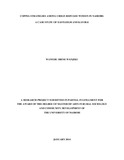| dc.description.abstract | The focus of the study was to understand coping strategies among urban refugee women in Nairobi: a case study of Eastleigh and Kayole. The study had four specific objectives which were: to examine the security risks faced by urban refugee women in Nairobi and how they cope with the risks; to find out how urban refugee women‘s children access education in Nairobi; to find out how urban refugee women access reproductive health care in Nairobi and lastly to find out the economical survival mechanism among the refugee women in Nairobi
In the literature review, urban refugee women are a vulnerable group faced with exploitation and abuse. The refugee women both in the camps and outside them are faced with very similar challenges, but distinct from the men. Outside the camps, they have to fend for families as there are no organizations which provide relief assistance except on very rare occasions in emergency situations. In theoretical framework the study was based on coping and feminism theories.
The research design was based on descriptive research analysis. The study sample constituted of 120 urban refugees sampled using simple random sampling technique and seven key informants sampled through purposive sampling technique. Both qualitative and quantitative data were collected using interview guide, observations, key informants and Focus Group Discussions.
The findings were: urban refugee women are faced with the security risks and they adapt coping strategies such as reporting to police or agencies and also alternatively shifting to new houses. The refugee women use their own means of income so as to ensure that their children access education. For urban refugee women to access reproduction health care they mainly visit public hospitals. The refugee women are involved in economic activities such as selling snacks and once faced with challenges instead of closing down their businesses they adopt to coping strategies such as seeking assistance from agencies and avoiding city council askaris.
The study recommends the following: UNHCR/Agencies working with urban refugee should set up adult education projects to cater for the refugee women due to the high illiteracy among refugee woman; that national and county governments should put more emphasis in enlightening other government/county officers on refugee documentation so as to avoid further harassment like in the case of city council askaris and further study on security risks with special focus on sexual abuse should be conducted so as to establish its magnitude and effects on urban refugee women. | en_US |

